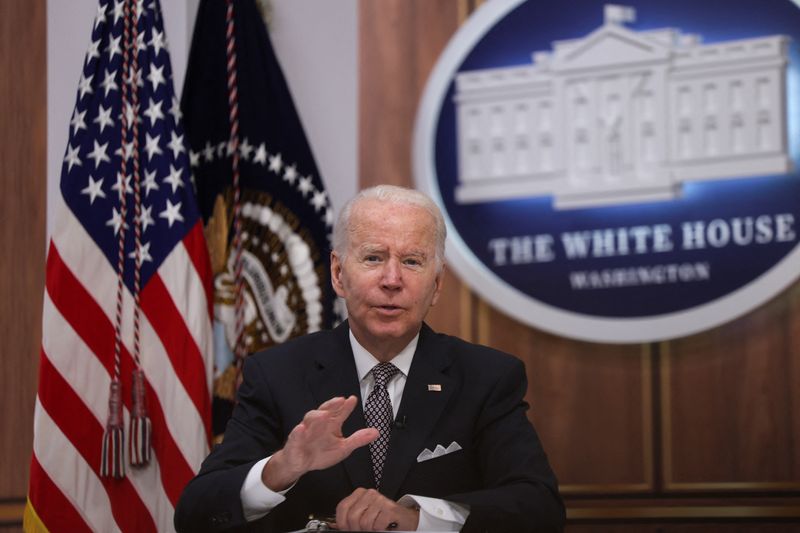WASHINGTON (Reuters) -The Biden administration is partnering with 11 East Coast states to accelerate development of offshore wind facilities and create jobs by supporting a domestic supply chain for the industry, the White House said on Thursday.
The move is part of President Joe Biden's push to fight climate change by expanding clean energy technologies. That agenda has been weighed down recently by rising prices, particularly for gasoline.
Offshore wind is a major component of that strategy. The administration has set a goal of reaching 30 gigawatts of capacity by 2030, up from just 42 megawatts currently with two small projects.
"The partnership will support efforts to provide Americans with cleaner and cheaper energy, create good-paying jobs, and make historic investments in new American energy supply chains, manufacturing, shipbuilding, and servicing," the White House said in a statement.
Biden administration officials met with state governors and labor leaders at the White House on Thursday.
"This is a real boost to our energy security," Biden told reporters following the meeting.
Administration officials were also scheduled to meet with oil refiners, one day after Biden floated a gasoline tax holiday to help ease fuel costs for U.S. families and workers.
The wind initiative will provide funding to create a domestic offshore wind supply chain and support a fleet of specialized vessels to build and service the projects, the White House said.
Ships ferrying workers and enormous components are crucial for offshore wind installations. Until the United States develops its own fleet, offshore wind developers are expected to rely on vessels built overseas.
Congress is considering legislation to require those vessels to be staffed by American crews or mariners from the nation that matches the flag of the ship.
The offshore wind industry opposes the provision on the grounds that there are not currently enough American mariners trained to operate those vessels. It is lobbying the Senate to exclude it from the bill, which passed in the House of Representatives.

"As written, the House maritime crewing provision is an existential threat to the future of offshore wind in the United States and the immediate result would be the delay and potential cancellation of the 19 offshore wind projects with power offtake contracts or awards," more than two dozen offshore wind companies and trade groups said in a letter to key senators on Thursday.
The federal-state wind partnership initially includes Connecticut, Delaware, Maine, Maryland, Massachusetts, New Hampshire, New Jersey, New York, North Carolina, Pennsylvania, and Rhode Island. It will seek to expand to Western and Gulf states as those markets develop.